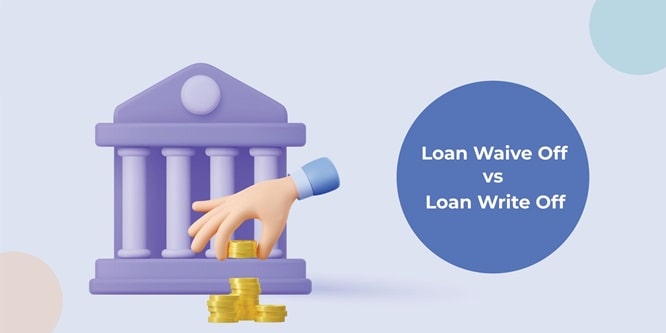You might have heard a lot in the news that this bank waived-off loans, or written off some loans, and the government has helped in all that. But looking at that piece of news, you might be like: What does this all mean though? If that’s you, then you might not know what are the actual differences between loan waive-off and loan write-off, right? Well, if that’s the case, then you should be looking forward to keep on reading this post until the very end, but why? That’s because we are about to give you the most detailed lowdown on what loan waive-off as well as loan write-off means, along with what are the key differences between these two. So yeah, that’s what you are here for, this is the post you shouldn’t be missing out on, you know? Alright, here we go now.
Loan Waive-Off
Let’s first understand what exactly are the Loan Waive-Offs, you know. So, a loan waive-off simply means you don’t need to pay that loan back anymore, yeah, that’s what it simply means. But why do lenders do that? Isn’t it like a loss to the lender or the bank? Well yeah, that kinda is a loss to the banks and the lenders, but it is what it is, you know? And if you are wondering what there are these things called Loan Waive-Offs, then know that these are actually done in some tough situations, like for example, farmers are getting hit with some really crazy weather conditions, and their crops get all ruined. In that case, all the loans they took for their farming needs can be waived off, not always, but chances are pretty good.
Loan Write-Off
But when we talk about Loan Write-Offs, it is not exactly the same as Loan Waive-Offs. Nah, man! See, we get it, both terms kinda sound the same, and you can mistake one for the other, you know? So what exactly does this loan write-off thing mean? Well, this is when the lender or the bank looks at someone’s loan and goes like “That cash? It looks like it is not coming back.” In such cases, the bank or the lender just write-offs the loan, but don’t get confused, they haven’t given you the clean chit, you know? This loan write-off thing is mainly to clear up the sheets in the backend, so yeah, the bank or the lenders can still try to get that loan amount back from you with everything they can try legally.

Key Differences Between Loan Waive-Off and Loan Write-Off
1. Definition and Purpose
Alright, first up, when we talk about a loan waive-off, we’re looking at what’s basically a financial “no worries” handed to someone who’s borrowed money, often because the government’s got their back. This is for folks hitting a rough patch, like farmers dealing with the aftermath of a wild storm. It’s not just about saying “forget about your debt;” it’s a helping hand to ease the financial strain on certain people or areas. Now, flip the script to a loan write-off, and what you’ve got is the lender waving the white flag on the debt, admitting they’re probably not seeing that money again. It’s a bookkeeping thing, helping them tidy up their finances by crossing out the bad debt. But don’t get it twisted; it doesn’t mean the borrower gets to walk away completely free you know?
2. Impact on Borrower
The difference for the person who took out the loan is night and day. With a loan waive-off, you’re off the hook entirely, no more debt, no more sweating about paying it back. This could be a game-changer, keeping your stuff safe from being taken away. On the flip side though, a loan write-off doesn’t let the borrower off the leash. The debt might be out of the lender’s books, but you’re still on the hook to pay it back. The lender can still come knocking, looking to get back what’s owed.
3. Legal Actions and Recovery Efforts
Post-loan waive-off, all bets are off. The lender, sometimes with a nod from the government, calls it quits on chasing the debt, figuring it’s either a lost cause or just not right to go after it under the circumstances. It’s like a fresh start for the borrower, no more looking over your shoulder for debt collectors. However, after a loan write-off, the lender still has the green light to drag you to court, dock your wages, or do whatever it takes to claw back the cash.
4. Impact on Collateral
When it comes down to loans that got your stuff like your car or office gear as backup, getting a waive-off is like getting your stuff back. It’s all clear, debt’s done, and you can breathe easy knowing your things are yours once again. This is a big deal because, for a lot of folks, that stuff might be a big chunk of what they own for personal use or their business. But, if we’re talking write-off, that’s a different story. The bank or whoever lent you the cash might keep your stuff or even sell it off to get back some of the money you owe them.
5. Financial Reporting
Looking at the books, a waive-off is like turning the page on that debt for good. It’s wiped clean from the lender’s side, with no hopes or dreams of getting that money back. It’s a full stop, end of story. On the flip side, writing off a loan is more like putting it on a different shelf. Sure, it cleans up the main ledger, but it doesn’t mean the lender has given up on someday getting back what was lent out you know? They’re still keeping an eye out for any cash that might come their way in the future.
6. When the Government Steps In
See, waive-offs usually come into play with a bit of help from the government, aiming to give relief to certain folks or industries hitting a rough patch. It’s a bit like a helping hand, showing that the waive-off is part of a bigger plan to ease economic or social stress. Write-offs, though, are more of a behind-the-scenes move by banks or financial places based on their own hunches about whether they’ll see their money again. No government cameo here. It’s all about keeping their own books in check.
7. Impact on Credit Score
Last but not least, let’s talk about what all this means for your credit score. A waive-off could actually be a silver lining, potentially giving your credit score a little boost or keeping it steady since it’s marked as settled. However, a write-off is more like a stain on your credit report, showing that things didn’t go as planned with paying back that loan. This can make getting loans down the road a bit of a hurdle, as it tells lenders you’ve hit some issues in keeping up with your debts, and that is no good of a news, you know?
Conclusion
That’s pretty much it. You might have witnessed all the doubts leave your mind while reading this post, right? Well, at least that’s what we aimed for. We tried our best to let you know about what is what, and the actual differences between loan waive-off and loan write-off. We hope things are much clearer for you now.

Meet Suhas Harshe, a financial advisor committed to assisting people and businesses in confidently understanding and managing the complexities of the financial world. Suhas has shared his knowledge on various topics like business, investment strategies, optimizing taxes, and promoting financial well-being through articles in InvestmentDose.com


